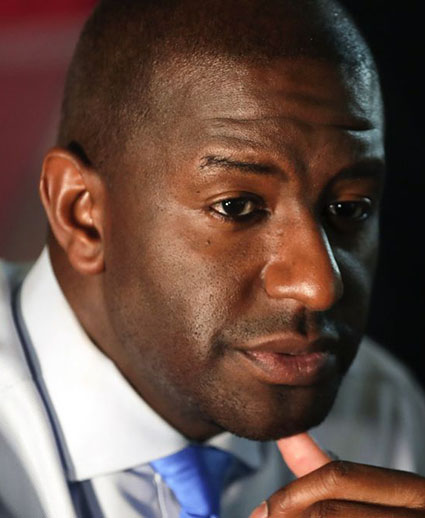(Reuters) – A liberal Democrat backed by Senator Bernie Sanders pulled off an upset in the Democratic primary for Florida governor yesterday, setting up a November showdown with a Republican backed by President Donald Trump.
Andrew Gillum, the mayor of Tallahassee, beat moderate Gwen Graham, a former U.S. representative and daughter of a prominent Florida politician, in a surprising victory after running as an unabashed progressive who backed “Medicare for all,” impeaching Trump and standing up to the National Rifle Association.
Gillum, 39, will face Republican U.S. Representative Ron DeSantis in November in one of the top governor’s races in the country, pitting the Democratic Party’s progressive wing against a conservative who won his primary by touting his closeness to Trump.
The race in the political battleground of Florida will be watched closely by both parties as a possible preview of the 2020 campaign, when Trump could be seeking re-election against a liberal Democrat.
Gillum, who would be the state’s first black governor, trailed in the polls through much of the race but surged in the final stages with the backing of Sanders and high-profile liberal donors like George Soros and Tom Steyer.
“We have shown the rest of the country that we can be the David in the situation where there is a Goliath,” he told supporters after his victory. “That you can be the non-millionaire, you can come from a working class family, and you can make your way to the top.”
The conservative DeSantis easily won the Republican primary by highlighting his enthusiastic loyalty to Trump. DeSantis, who was endorsed by Trump, beat state Agriculture Commissioner Adam Putnam.
“I am not always the most popular guy in D.C., but I did have support from someone in Washington. If you walk down Pennsylvania Avenue, he lives in the White House with the pillars in front of it,” DeSantis told supporters after his win, noting he had spoken to Trump.
Florida also will host one of the country’s top U.S. Senate races between term-limited Republican Governor Rick Scott, who won the Senate nomination against token opposition, and incumbent Democrat Bill Nelson. Nelson ran unopposed for the nomination.
Voters in Arizona were also picking candidates for the November elections, when Democrats will try to pick up 23 seats in the U.S. House of Representatives and two seats in the Senate to gain majorities and slam the brakes on Trump’s legislative agenda.
Republican establishment favorite U.S. Representative Martha McSally has led consistently in opinion polls over former state Senator Kelli Ward and former Maricopa County Sheriff Joe Arpaio in a three-way battle to prove which candidate is most loyal to Trump, who won Arizona by 4 percentage points in 2016.
The contest could be critical to the balance of power in the Senate in November. The Arizona seat of retiring Republican Jeff Flake, a Trump critic, is considered one of the two top takeover targets for Democrats, along with Nevada.
McSally is seen as a stronger general election candidate than either Ward or Arpaio, both hard-line conservatives. McSally has already launched advertising aimed at her likely Democratic opponent in November, U.S. Representative Kyrsten Sinema.
The primaries in Arizona and Florida on Tuesday are the last big day of state primaries before November’s elections. After Tuesday’s primaries, only five states remain to pick candidates before full attention turns to the November election, when all 435 House seats and 35 of the 100 Senate seats will be at stake.










